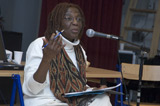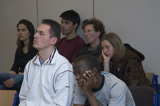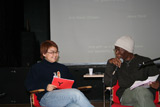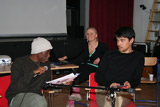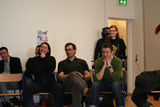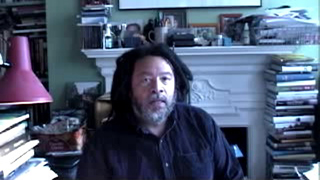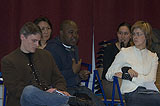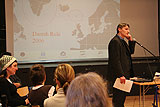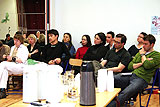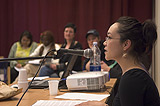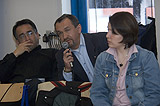
Debating Independence: Autonomy or Voluntary Colonialism?
The Teachers’ Training School of Greenland, Nuuk
April 22 – 23, 2006
This two-day public hearing debated self-government and various models of autonomy and accountability. It sought to complicate our understanding of dependence and independence according to such dividers as class, race, gender, and sexuality. Audiences were encouraged to participate and share their own experiences with the speakers. Simultaneous interpretation was available throughout the hearing.
Paul Gilroy was unable to attend but sent a video letter instead, which was
screened the first day of the hearing.
Click here for audio slide shows of the public hearing presentations
Participants
M. Jacqui Alexander (Trinidad & Tobago/USA/Canada)
Katrine Dirckinck-Holmfeld, Humphrey Polepole & Ivaaq Poulsen in collaboration with Inuit Youth International (Denmark, Tanzania & Greenland)
Paul Gilroy (United Kingdom)
Høgni Hoydal (The Faroe Islands)
Aviâja Egede Lynge (Greenland)
Moderator
Daniel Thorleifsen (Greenland)
Public Hearing Program
Day 1: April 22
Introduction to the public hearing by Kuratorisk Aktion (Curators of Rethinking Nordic Colonialism)
(6:10 min.)
“Colonial Crimes and Convivial Cultures,” a video letter by Paul Gilroy (Anthony Giddens Professor of Social Theory, Department of Sociology, London School of Economics, United Kingdom). The presentation is followed by & Questions & Answers session. (55:04 min.)
“The Best Colony in the World,” a presentation by Aviâja Egede Lynge (MA in Social Science and Social Anthropology from the University of Edinburgh, Scotland). The presentation is followed by a Questions & Answers session. (58:35 min.)
“Colonialism and its Contemporaries: Feminist Reflections on the State of War and the Meaning of Solidarity,” a presentation by M. Jacqui Alexander (Professor at the Institute for Women’s Studies and Gender Studies, University of Toronto, Canada). The presentation is followed by a Questions & Answers session. (63 min.)
Open Discussion and Closing Remarks. (21:54 min.)
Day 2: April 23
“Neo-colonialism with a Human Face – the Cosy Self-Colonization in Danish Home Rule,” a presentation by Høgni Hoydal (Chairman of the Faroese left-wing independence party Tjóðveldisflokkurin (The Republicans) and member of the Faroese and Danish Parliaments). The presentation is followed by a Questions & Answers session. (72:13 min.)
“Youth Writes Back TV: Performative Notes from a Workshop on Youth Experiences and Postcolonial Situations,” a presentation by Katrine Dirckinck-Holmfeld (Visual artist and MFA Candidate at The Royal Danish Academy of Fine Arts, Copenhagen, Denmark), Humphrey Polepole (Secretariat Director of the Tanzania Youth Coalition (TYC) and Steering Committee Member of the Sustainability Watch Network) & Ivaaq Poulsen (Professional diver and member of Inuit Youth International, Nuuk, Greenland) in collaboration with Inuit Youth International (IYI) (grass roots organization from Nuuk, working with Inuit youth issues). The presentation is followed by a Questions & Answers session. (39:19 min.)
M. Jacqui Alexander is a teacher, writer, and scholar, currently at the Institute for Women’s Studies and Gender Studies at the University of Toronto. She has written extensively on the heteronormative, regulatory practices of the modern state and the different ways in which radical communities, both outside and inside the academy, position themselves in relation to these practices. Her most recent scholarship has taken up questions of the sacred dimensions of experience and the meaning of sacred subjectivity. It also involves writing the life of an enslaved Kongolese woman in the Caribbean. Her publications include: Feminist Genealogies, Colonial Legacies, Democratic Futures (Routledge, 1997) with Chandra Talpade Mohanty; Sing, Whisper, Shout, Pray! Feminist Visions for a Just World (Edgework, 2002) with Sharon Day, Lisa Albrecht, and Mab Segrest; Pedagogies of Crossing: Meditations on Feminism, Sexual Politics, Memory and the Sacred (Duke, 2006). She is a member of the Caribbean Association for Feminist Research and Action. [M. Jacqui Alexander]
For Act 2’s public hearing, M. Jacqui Alexander contributed with the paper “Colonialism and its Contemporaries: Feminist Reflections on the State of War and the Meaning of Solidarity.” She summarizes the paper in the following words: “The paper marks the continuities and discontinuities between this contemporary moment of empire building and earlier forms of colonization in order to establish how the colonial is implicated in the modern. I use a transnational feminist framework to show that these processes are simultaneously racialized, sexualized, and gendered. ‘State’ here is meant to refer to the militarized imperatives at work in the neo-imperial state, the states of violence that promote silence and patriotism, and the psychic states that rely on segregations and the production of the ‘enemy’ as grounds on which to constitute citizenship. I end by reflecting upon the need to build interdisciplinary political solidarity networks that cross boundaries of various kinds.” [M. Jacqui Alexander] To download the paper, click ![]() here.
here.
Lives and works in Dar es Salaam, Tanzania
Lives and works in Nuuk, Greenland
Founded 2001 in Nuuk, Greenland. Based in Nuuk
Katrine Dirckinck-Holmfeld is a MFA candidate at The Royal Danish Academy of Fine Arts in Copenhagen. Recently, she has been living in Beirut, Lebanon, where she has continued her studies at Acadèmie Libanaise des Beaux Arts (ALBA) and has followed the program of an art teacher in one of the kinder gardens of Ghassan Kanafani’s Cultural Foundation in the Palestinian camps in Lebanon. Katrine considers herself a cultural worker informed by feminist and critical theory. Her artistic investigations take on various directions and forms, from activist strategies to more conventional artistic practices. But in large, her projects have more or less been turning around artistic education and the creation of a plural public sphere. She has co-organized, curated, and published the Women’s 96th Anniversary (2004), a feminist subversion of the 250th Anniversary of The Royal Danish Academy of Fine Arts in Copenhagen. Other than participating in a number of not-worth-mentioning exhibitions in Denmark, Mexico, and Lebanon, she has written articles and reviews and held workshops, latest “Nationalism, Cultural Territories and the Role of Cultural Producers” at the Next Stop Summer University in Vukovar, Croatia, 2005. [Katrine Dirckinck-Holmfeld]
Humphrey Polepole is the current Secretariat Director of the Tanzania Youth Coalition (TYC), the biggest youth movement in Tanzania. He is also the Steering Committee Member of the Sustainability Watch Network under Tanzania Coalition on Sustainable Development (TCSD). He has recently been elected to join the Steering Committee of the Social Watch preparation at the East African sub-region and is a member of Policy Advisory Board of MS Tanzania. Polepole has held several positions at local, national, and international levels in the civil society and in the United Nations as a United Nations Environment Programme Associate Youth Advisor for Africa. Several times, he has been part of the United Republic of Tanzania (URT) government delegation, attending high-level meetings at the United Nations Framework Convention on Climate Change (UNFCCC). He has also served the World Youth Organization on Climate Change as a Southern region youth representative. In addition, Polepole has taken an active role in the Rio+10 NGO process in the South and is a Chair of the East African Youth Coalition (EAYC) on Sustainable Development. He has taken a lead role in several reviews of policies, including the National Strategy for Growth and Reduction of Poverty (NSGRP) and the post review and evaluation process for the Johannesburg Summit, focusing on the Tanzania Rio+10 partners and the East African Rio+10 NGO Coalition participation. He was selected to join a six people taskforce to anticipate the future of the sustainable development NGO process in East Africa, being the youngest member of the team. He has worked on policy issues as an analyst at local, national, and international levels. Furthermore, he is a trainer on research methodologies and has conducted trainings on Participatory Rural Appraisal (PRA), Appreciative Inquiry (AI), and Participatory Learning and Action for Community Development (PLA-CD). [Humphrey Polepole]
Ivaaq Poulsen is a professional diver and active member of Inuit Youth International (IYI). IYI is a grass roots organization, which was founded during a general assembly in Nuuk in 2001. From the very beginning, the goal of IYI has been to work for and involve youth in a progressive national and local collaboration in a time of great turbulence. IYI has organized several events on the questions of Inuit identity, spirituality, and how to overcome the barriers of cultural taboos such as suicide, homosexuality, and so forth. [Ivaaq Poulsen]
Katrine Dirckinck-Holmfeld’s, Humphrey Polepole’s, Ivaaq Poulsen’s & Inuit Youth International’s presentation for Act 2’s public hearing was titled “Youth Writes Back TV: Performative Notes from a Workshop on Youth Experiences and Postcolonial Situations” and took the form of a live TV-show. Acting as hosts and guests in the show, the group presented experiences gathered during their collaborative project for Act 2’s exhibition: a workshop and a multimedia installation examining postcolonial situations from a youth and educational perspective (click here for more info).
The group summarizes their presentation in the following words: “A school…on the black board is written: ‘A girl walks toward her mother with a bucket.’ The bucket starts bursting…its content is floating over the edge…What happens when youth writes back? Equipped with digital cameras, cellular phones, and audio recording equipment, we went out into the city of Nuuk and its surroundings and investigated themes of ‘My City,’ ‘Language,’ and ‘Dig-I-dentity.’ During the public hearing, ‘Youth Writes Back’ created a platform for presenting our findings gathered during the preceding workshop and installation in Act 2’s exhibition. Our intention was to raise a discussion on education as a creative process that will enable deeper understandings of our different cultural values, environments, and perspectives on ‘glocal’ issues.” [Katrine Dirckinck-Holmfeld] To download the presentation
manuscript, click ![]() here.
here.
To download the PowerPoint presentation from the presentation (9 images) as a PDF, click ![]() here.
here.
Paul Gilroy teaches at the London School of Economics. Before that, he was a Charlotte Marian Saden Professor of Sociology and African American Studies at Yale University, where he was Chair of the African American Studies Department. He is the author of several books and his work has been translated into eleven languages. [Paul Gilroy]
Paul Gilroy was supposed to have delivered the presentation “Colonial Crimes and Convivial Cultures” during the first day of Act 2’s public hearing.
However, he was unable to attend and sent a video letter
instead. The very first item in the hearing, the screening was followed by a lively discussion. In his synopsis of the video letter, Gilroy writes: This video letter “…will discuss the relationship between the history and remembrance of colonial rule, and the constitution of multicultural societies in the postcolonial phase. It will address the arguments towards the revival of empire that have been such a notable feature of the ‘war on terror’ as well as the predicament of various ethnic minorities in the overdeveloped countries.” [Paul Gilroy] To download a transcript of the video letter, click ![]() here.
here.
Høgni Hoydal is the Chairman of Tjóðveldisflokkurin in the Faroe Islands. Tjóðvelisflokkurin is a left-wing independence party and currently the biggest political party in the Faroe Islands. Aside from being a member of the Faroese Parliament, Hoydal has been elected to the Danish Parliament for Tjóðveldisflokkurin since November 2001. From 1998-2003, he held the post of Deputy Prime Minister and Minister for Self-Government, Judicial & Nordic Affairs in the Faroe Islands. Hoydal lives together with Hildur Hermansen and they have three children. He has a degree in History and Communication from Roskilde University, Denmark. Before becoming a politician, he was employed as a seaman, temporary teacher, and as a reporter for the Faroese television. Hoydal has written two books concerning political affairs. Myten om Rigsfællesskabet (The Myth of the Union) was published in the spring of 2000 and the second, Frælsi er ábyrgd (Freedom Is Responsibility), was published in December that same year. [Høgni Hoydal]
Høgni Hoydal participated in Act 2’s public hearing with the PowerPoint presentation “Neo-colonialism with a Human Face – the Cosy Self-Colonization in Danish Home Rule.” He summarizes the presentation in the following words: “Denmark has been able to maintain the sovereignty over two of its colonies right into the age of globalization. This has been possible by allowing room for certain cultural decisions in the home ruling countries Greenland and the Faroe Islands, while the political, economical, and social structures between Denmark and the colonies have led to an effective self-colonization. The self-colonization is based on the myth of Denmark as the assisting and kind mother, who protects her children against the dangerous world outside and who supports them economically without having any self-interest in the relationship. What does this mean to the Faroese and Greenlandic societies and their development and possibilities in the age of globalization? Is it possible to change the Danish self-understanding, which continues to block for the alteration of the relationship? Is the cosy self-colonization becoming the model for neo-colonization of the 21st century? Taking its starting point in Faroese experiences, the presentation addresses these questions and proposes ways out of neo-colonialism.” [Høgni Hoydal] To download a transcript of the PowerPoint presentation, click ![]() here.
here.
Aviâja Egede Lynge received her MA in Social Science in Social Anthropology from Edinburgh University, Scotland in 2002 and her BA degree in Tourism Management from Queen Margaret University College, Edinburgh in 2000. During her studies, her fields of interests were postcolonialism, culture, development of indigenous societies, and rural areas. Since 2003, Aviâja has been working for the Greenland Home Rule Government as a Secretary to the Minister of Industry, Agriculture & Labour. Prior to that, she worked in a privately owned Greenlandic company, working with research, courses, integration of Danish and Greenlandic children in the public schools, and development of a Greenlandic empowerment concept. From 1998-2003, she was a board member of different institutions/organizations: Greenland Tourism – The National Tourism Board of Greenland, Inuit Youth International (a grass roots organization, which works to strengthen the cultural and spiritual development through promoting higher self-worth among Inuit youth), SAMIK (a co-operation between Greenland and Iceland for the development of tourism and cultural ties), and Katuaq – Greenland Cultural Centre. She has traveled most of the world, and her greatest interests are better cross-cultural understanding between peoples, politics, postcolonialism, and indigenous peoples’ affairs. She has attended the UN Permanent Forum twice, is an active debater in the Greenlandic and Danish press, and has been speaking in various forums. Currently, she is working on a Greenlandic debate book about the influence of colonialism on Greenlandic identity and self-determination. She hopes that the book will contribute to the written history of Greenland and that it will motivate young Greenlanders to study where they came from to better understand who they are today. [Aviâja Egede Lynge]
Aviâja Egede Lynge participated in Act 2’s public hearing with the paper titled “The Best Colony in the World.” She summarizes the paper in the following words: “There is a need to look beyond our colonial history. In Greenland, we have always been ‘taught’ that ‘Greenland is one of the best colonies in the world.’ However, this should not prevent us from acknowledging how 250 years of colonization has influenced us as a people and how it still affects our daily lives. When people in Greenland discuss problems such as equality between Danes and Greenlanders, the words ‘racist’ and ‘nationalist’ are often used. Instead of trying to understand how concepts like ‘equality’ and ‘nationalism’ relate to the past, it seems as if the debate never goes further. My paper thus takes the audience through Greenland’s colonial history (political and cultural) in order to discuss the colonial influence on Greenlandic identity, continuing feelings of subordination, and a continued search for acceptance of our ethnic identity. The paper focuses on the question of how ethnic identity plays a role in the picture of ‘equality between Greenlanders and Danes’ with regards to the colonial period and today. The paper proposes that the colonial influence on Greenlandic identity still has implications today, and that the symptoms of nationalism are leftovers from a lack of mental de-colonization.” [Aviâja Egede Lynge] To download the paper, click ![]() here.
here.
